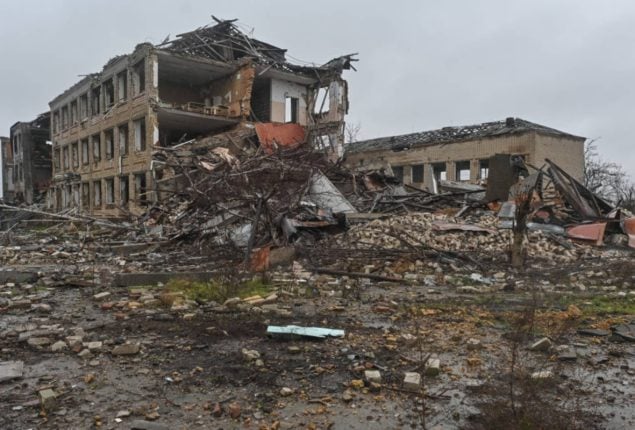Nepal earthquake: Survivors bury dead & face uncertain future
Nepal earthquake survivors bury dead & face uncertain future. A remote riverside...

Ukraine Reports Record-High Russian Bombing in Kherson Region
In southern Ukraine’s Odesa, an elderly woman, sitting alone amidst unfamiliar faces at an aid center, is a poignant symbol of resilience.
Nina, aged 91, survived German air raids during World War Two, and now, she finds herself a refugee once more.
Every day, hundreds of individuals arrive at this center, escaping their homes near the front lines, where conflict and shelling have escalated. Like Nina, many hailing from the Kherson region are seeking shelter.
On Monday, Ukraine’s interior minister disclosed that Russia had launched 87 guided aerial bombs overnight, marking the highest count since the war’s onset.
Footage released by Kherson’s regional government vividly captures the extensive devastation inflicted on a high-rise apartment building and multiple residences.
“I couldn’t sleep,” Nina tells the media. “I couldn’t eat, there were explosions.”
Her eyes, hooded with age, are exhausted. As she speaks, it becomes evident that the last few weeks have rekindled the painful memories of 80 years ago.
She sighs. “I want to die in peace, not war.”
Amidst the chaotic hustle of aid workers overwhelmed by the weight of countless shattered lives, the elderly woman sits in the midst of their efforts.
These dedicated workers tirelessly distribute essential provisions like food, clothing, and medical care, ensuring that refugees receive free lodging. Most newcomers arrive with little more than the clothes on their backs.
Valentina, holding onto a solitary plastic bag containing her meager possessions, escaped from Kherson just a few days ago.
The city and its surrounding region remain partially under Russian occupation, making it unbearable for her to stay.
“The bombardment was intense. They attacked, shelled. Sirens sounded all the time. It was terrifying.”
Valentina decided to leave when the local children’s hospital was hit.
“Volunteers helped me to get out. As for possessions – only the most necessary ones.”
In recent weeks, Russia has escalated its offensives, resulting in civilian casualties and injuries during some of the most severe aerial bombardments witnessed in Ukraine this year.
The Kherson region, in particular, has experienced a heightened frequency of air strikes, with the local government reporting intense attacks in settlements along the frontline.
“Two months ago, we were getting one or two aerial bombs a day. Now it’s 40,” says Oleksandr Tolokonnikov, the spokesman for the authority.
He notes that the shelling, originating from artillery, tanks, and mortars, has witnessed a twofold increase in recent weeks.
In the face of these relentless attacks, many residents have grown accustomed to the constant threat. He reflects on an incident from the previous autumn when a shell struck a hospital, tragically taking the life of a newly qualified doctor on his first day of duty.
Mr. Tolokonnikov recalls observing people on the streets not far from the incident. Despite the ongoing shelling, these individuals walked calmly in the opposite direction.
“Some people don’t even blink anymore.”
The increase in attacks on Kherson is likely linked to the ongoing Ukrainian counteroffensive, which, although progressing slowly, has seen troops making incremental advances in certain parts of the region.
In the Donetsk and Zaporizhzhia regions, Ukraine has achieved some limited successes. However, Russia is also aggressively pursuing its objectives, with reported casualties in the thousands as they strive to gain control of the fiercely contested town of Avdiivka in the Donetsk region.
Russian forces have encircled the town from three sides, intensifying the conflict.
Tragically, Ukrainian soldiers are also losing their lives, adding to the deep sense of fear experienced by individuals like Daria.
Her husband, who was conscripted into the army in May, was recently deployed to defend Avdiivka. He had hesitated to share this news with her initially to prevent unnecessary worry but assured her that he would call in a few days.
Two weeks have passed since that promise, and Daria has not received any word from him.
“We’ve been married for 26 years” she says, her face pale with worry, as we talk near the beach at Odesa’s seafront.
She takes out her phone, scrolls through a collection of photos, and presents images of the couple radiating joy in selfies or captured alongside their two adult daughters during a recent birthday gathering.
The memory of their final farewell weighs heavily on Daria’s heart. She had bid him farewell with a wave as he returned to the conflict.
“He got on the bus and I stood there for a long time crying. The feeling never leaves me – that I saw him for the last time.”
“We hope so much that he’s ok,” Daria says.
She gazes upon the gray sea, its surface obscured by the heavy clouds above.
The currents of this war persist in their unpredictable ebb and flow, inundating the nation with an overwhelming sense of sorrow and apprehension.
To stay informed about current events, please like our Facebook page https://www.facebook.com/BOLUrduNews/.
Follow us on Twitter https://twitter.com/bolnewsurdu01 and stay updated with the latest news.
Subscribe to our YouTube channel https://bit.ly/3Tv8a3P to watch news from Pakistan and around the world.
Catch all the International News, Breaking News Event and Latest News Updates on The BOL News
Download The BOL News App to get the Daily News Update & Follow us on Google News.